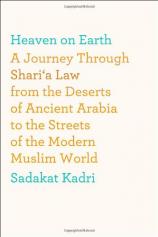Reading Group Guide
Discussion Questions
Heaven on Earth: A Journey Through Shari'a Law from the Deserts of Ancient Arabia to the Streets of the Modern Muslim World

1. How did Heaven on Earth change your perception of the shari‘a? What do you believe the role of ancient texts should be in guiding modern jurisprudence?
2. In the opening pages, Sadakat Kadri describes a trip to Badaun, his father’s birthplace in northern India (and home to his ancestor, the Sufi Abdullah), where millenia-old Hindu traditions became “cross-fertilized” with Islam in the thirteenth century. How do these scenes capture the diversity of Islam? What does Heaven on Earth ultimately say about the human need for religious tradition?
3. How did you react to the fact that jinns are still awarded legal significance, and can even be sentenced to execution, in some parts of the world? Is the practice very different from Christian exorcism?
4. Elsewhere in the prologue, Kadri compares the moral significance attached by some Muslims to the Prophet Muhammad’s contemporaries to be analogous to the reverence felt in America toward the Founding Fathers. Is the comparison fair or unfair?
5. In chapter 1, Kadri describes the four sins that the Qur’an requires humanity to punish (theft, fornication, falsely accusing someone of fornication, and the “waging of war against Islam or spreading of disorder in the land”) and a fifth penalty—for intoxication—that was institutionalised after the Prophet’s death. How do these mandatory punishments (haddood) compare to the types of “sins” that concern Western lawmakers today? What would American society be like if our legislative and judicial branches routinely claimed to be following divine revelation when they created or enforced legislation? What do you make of Kadri’s observation later in the book (at the end of chapter 10) that an urge to punish exists in countries all over the world—and his implicit suggestion that secular justice can be at least as inhumane and unfair as those legal systems that are operated and exploited in Islam’s name?
6. What insight did you gain into the seventh-century Arab world and the Prophet Muhammad’s life, culminating in his exile in Medina? In what ways do his personal circumstances illuminate aspects of shari‘a law—and what do they say about the ways it should be understood and given effect today?
7. Kadri describes the proliferation of Islam in the wake of the Prophet Muhammad’s death in 632; within the next decade, the Byzantine Empire would lose Syria, while Persia, Jerusalem, and Alexandria were conquered by Arab forces. Could Islam have spread so rapidly if it had not become militarized? How does the alliance of religion and military strength manifest itself today, particularly in light of the Arab Spring?
8. The process of compiling the Qur’an was marked by Caliph Uthman’s belief in an incorruptible version of the text: in 651, he ordered that all circulating variants be burned. As Muslims moved toward becoming a people of the book, what challenges did arise? Is it possible for faith to flourish without a sanctified scripture?
9. Chapter 5 explores the history of factions between Shi‘as and Sunnis (and the four schools of Sunni shari‘a interpretation: Hanbalites, Hanafites, Malikites, and Shafi‘ites). What do these schisms indicate about power struggles within Islam, and the spectrum of orthodoxy in all faiths?
10. Throughout the book, Kadri draws comparisons between early shari‘a and early Judeo-Christian approaches to justice, noting that the Prophet Muhammad encouraged forgiveness and recompense. Was the shari‘a progressive compared to the teachings of Jesus and the Torah? Could the shari‘a principles make earth a “heavenly place,” steeped in “life-giving waters”?
11. Discuss the role of women in the formative years of shari‘a law. We’re told that the Prophet Muhammad’s wife, Khadija, was an independently wealthy businesswoman, and that the Qur’an made provisions for a wife’s property rights and for the annulment of unhappy marriages. Were these freedoms negated by the Prophet’s holy revelation that Muslim men could have up to four wives at a time? What emotions did young A’isha’s story inspire in you?
12. The author tells us that, according to the Qur’an, the Prophet Muhammad spoke out against economic injustice, evidenced in part by an alms tax (zakat) he introduced, and that he denounced bigotry. Does shari‘a law help or hinder the cause of liberating the oppressed?
13. As you read the sections on diminished Islamic power in the wake of the Crusades and Genghis Khan’s Mongol invasions, what radical shifts did you notice in the shari‘a legacy?
14. Discuss the author’s summary of World War I in chapter 8, which depicts the Ottoman Empire’s alliance with Germany, vying against Britain for power in the Middle East, leading to the 1948 partition of Palestine. Who is ultimately to blame for the rise of hard-line Islam that often obscures the Prophet Muhammad’s original vision? Who currently has the power to stem the tide of radicalism?
15. In January 2012, a federal appeals court struck down a voter-approved amendment to Oklahoma’s constitution. The amendment, discussed in the book’s closing pages on Western intolerance, would have forbidden Oklahoma’s courts from considering shari‘a law. Can Western courtrooms truly resolve this conflict? Will centuries of historical conflict repeat themselves as Europe and the United States try to contend with multiculturalism?
Heaven on Earth: A Journey Through Shari'a Law from the Deserts of Ancient Arabia to the Streets of the Modern Muslim World
- Publication Date: April 10, 2012
- Hardcover: 384 pages
- Publisher: Farrar, Straus and Giroux
- ISBN-10: 0374168725
- ISBN-13: 9780374168728







